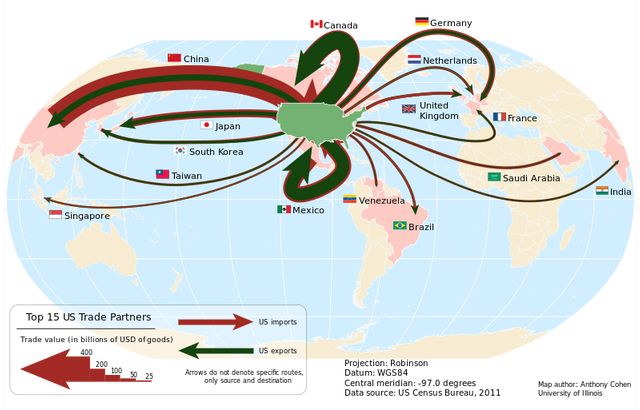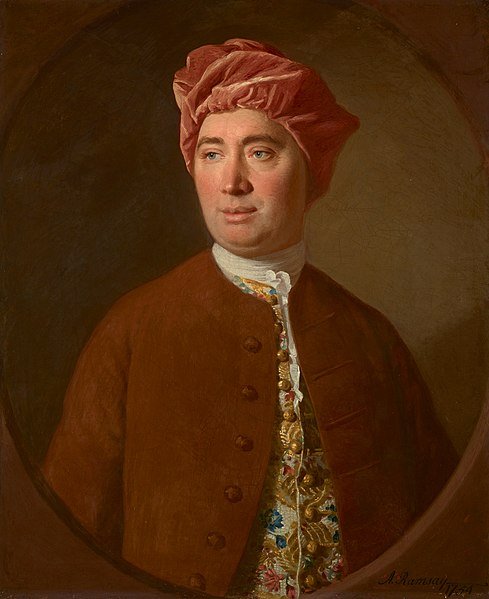Why Trade Deficits are Good for the U.S. (It’s Not The Reason You Think)

Since the election of Donald Trump, trade has become a hot topic in U.S. politics. President Trump has threatened many countries throughout the world with trade tariffs. Most recently, China has become the focus of the President’s ire. He has imposed a 10% trade tariff on a huge range of Chinese products. And he has threatened to raise this tariff to 25%.
Many opponents of Trump have criticized his policies as economically ignorant. These critics cite Adam Smith, David Ricardo, and other classical economists who have argued that free trade benefits all countries and that trade deficits are not a problem. But supporters of Trump’s policies have argued that these economists are wrong and that trade deficits actually undermine the well-being of Americans.
In this article, I will first explain the classical debate between advocates of mercantilism and free trade. Second, I will explain why this debate is irrelevant to today’s economic system. Third, I will explain why trade deficits are good for the U.S., but the reasons I will give are completely different than the ones given by David Hume, David Ricardo, and others.
Contrary to what many others say, I will argue that trade deficits are good for the U.S. and bad for the rest of the world. I will further argue that the U.S. should either work with other countries to alleviate this problem or else should simply continue running deficits and let other countries deal with the issue.
The Mercantilist argument

Image: "Austria Over All, If She Only Wills It" by Phillip Wilhelm von Hornick
The term “mercantilism” first arose as a derogatory term to refer to “mainstream” economists that worked for industry or the government. This was in contrast to academic economists who favored free trade. Because of this, it’s not easy to pinpoint exactly who is an authentic advocate of “mercantilism” and who is not. Nevertheless, there are a few thinkers who are constantly pointed out by historians as examples of mercantilism. This includes Thomas Munn, James Steuart, Giovanni Botero, Antonio Serra, and Phillip Wilhelm von Hornick, amongst others.
The most systematic defense of mercantilism is from von Hornick. In his “Austria Over All, If She Only Wills It,” von Hornick argues that countries must follow nine principles in order to have their citizens grow wealthy.
- All fertile land should be cultivated so that the country has plenty of food
- All commodities that exist in the country should be mined/developed
- The citizens should be encouraged to reproduce and grow the population
- Money (gold and silver) should not be allowed to leave the country
- Consumers should make every effort to buy products made from within the country
- If imports are absolutely necessary, they should only be paid for with exports, not with money
- Imports should only be in the form of raw materials. Finished products should not be allowed
- The government and the public should always work to promote the sale of manufactured goods to foreigners
- No imports should be allowed if there is enough of a good produced locally to satisfy demand
These nine principles form the basis of the mercantilist program, which provides high trade tariffs to prevent money from flowing out of the country (to prevent trade deficits).
David Hume’s rebuttal

Many early classical liberals argued against the mercantilist view. The clearest of these is David Hume. In his “Essays: Moral, Political, and Literary,” Hume argues that hoarding money (running trade surpluses) is a waste of time. All it will do is lead to an increase in prices as the quantity of money in the domestic economy increases. This will cause foreign goods to be cheaper, increasing the desire of the citizens for foreign goods.
“Again, suppose, that all the money of GREAT BRITAIN were multiplied fivefold in a night, must not the contrary effect follow? Must not all labour and commodities rise to such an exorbitant height, that no neighbouring nations could afford to buy from us; while their commodities, on the other hand, became comparatively so cheap, that, in spite of all the laws which could be formed, they would be run in upon us, and our money flow out; till we fall to a level with foreigners, and lose that great superiority of riches, which had laid us under such disadvantages?”
In Hume’s view, mercantilists are confusing money with wealth. Gold and silver are a valuable form of wealth, but they are not any more valuable than ships, food, guns, clothing, or (in modern times) automobiles, computers, or any other product. When one country trades money for clothing from another country, the wealth of the first country changes from gold to clothing and the wealth of the other country changes from clothing to gold. Neither country has become less wealthy than the other.
David Ricardo and the case for free trade

Expanding upon this idea, David Ricardo argued in “On the Principles of Political Economy and Taxation” that free trade not only doesn’t harm one country to the advantage of another, it actually makes both countries wealthier. To illustrate why, Ricardo considers a hypothetical world made up of only two countries: England and Portugal.
Let’s say that it costs England approx. 67 labor-hours to produce one shirt and 80 labor-hours to produce one pint of beer . Meanwhile, it costs Portugal 67.5 labor-hours to produce one shirt and 60 labor-hours to produce one pint of beer. In this case, Portugal has an “absolute advantage” in shirt production, since it can produce a shirt with less labor-hours.
However, for every shirt produced, Portugal must give up 1.125 pints of beer (1/60 = number of pints per labor-hour, * 67.5 labor-hours per shirt = 1.125 pints). By contrast, England only has to give up approx. 0.84 pints of beer for each shirt produced (1/80 = number of pints per labor-hour, * 67 labor-hours per shirt = approx. 0.84). For this reason, England has a “comparative advantage” over Portugal in the production of shirts vs. beer.
In this case, it makes sense for England to produce nothing but shirts and Portugal to produce nothing but beer. England can then trade its excess shirts for Portuguese beer and Portugal can trade its excess beer for English shirts. As a result, both countries will have more shirts and more beer. As a result, citizens from both countries will be wealthier.
Criticism of Ricardo
In response to Ricardo, many critics have argued that his theory assumes capital and labor are immobile. In other words, it assumes that the comparative advantage of one country is somehow inherent to that country’s geography. In the real-world though, more efficient machines can be moved from one country to another, as can cheaper labor. So just because a country has a comparative advantage right now, this doesn’t mean other countries should trade with it.
Supporters of Ricardo have responded to this argument by saying that capital movement is too small to make a difference or that there are market forces that regulate the movement of capital and labor such that free trade is still always beneficial.
The gold-standard assumption in this debate
While the debate I have outlined above is interesting, there is actually a very significant problem with applying it to the current position of the U.S. in the global economy.
The mercantilists had argued that countries need to run trade surpluses in order to accumulate money. Back then, “money” was gold and silver. No matter how fallacious the mercantilist arguments were, one has to admit that they had a point. A country that accumulates more gold and silver is storing up savings for the future. This will allow the residents of that country to purchase more imports at some point in the future.
The mistake the mercantilists made was in thinking that gold and silver should be piled up indefinitely. The truth is that there is no point in running trade surpluses unless you are going to run trade deficits at some point in the future. Otherwise, you are just piling up a bunch of yellow metal in vaults for no reason.
Still, the mercantilist argument isn’t completely absurd when placed in the context of an international gold standard. But when placed in the context of a fiat currency system, it is absolutely ridiculous.
Why trade deficits are good for the U.S.
In the context of a U.S. dollar system, the U.S. does not need to save up gold and silver in order to pay for imports in the future. Therefore, it has no need to ever run a trade surplus. The U.S. can always print money and pay for whatever imports it wants. The more goods it imports, the more wealthy its inhabitants will grow.
In order to understand why, we have only to consider why trade is mutually beneficial under a gold-standard. Under a gold-standard, one country trades gold for another country’s goods. This results in the first country having more goods and the second country having more gold. Neither country is worse off as a result. However, in order to get this gold in the first place, the first country must either mine gold from their own natural deposits or else run a trade surplus for a period of time in order to build up its gold reserves.
Under the current dollar system, however, when Americans buy imports, they end up with more goods. This definitely increases their wealth. But what do U.S. trading partners get in return? Ultimately, the only thing a person can do with a U.S. dollar is to loan it back to the United States Government (buy Treasuries). The U.S. Government then takes this money loaned to it and spends it on Americans through employment, welfare, and tax cuts. In return, it pays the creditor an interest-rate. But a 1-year loan to the U.S. Government pays a paltry 2.7%, barely above the 2018 average rate of inflation of 2.5%. In addition, this interest-rate is likely to be pushed down to zero by a new government printing-spree in the near future, since this is what American voters want.
And can you blame U.S. voters? Since Americans do not have to be taxed to pay for government services, and since imported goods can be paid for by printing money, it’s hard to imagine American voters ever voluntarily opting for anything other than the status quo.
This is why trade deficits are good for the U.S. Trade deficits allow the U.S. to import goods, raising the standard of living of its inhabitants, but without having to pay for these goods in real money - without having to run trade surpluses for a period of time or employ inhabitants in the mining of gold.
Why U.S. trade deficits are bad for the world
Despite trade deficits being good for the U.S., it should be obvious by now why they are bad for the rest of the world. If there are U.S. trade deficits, it means the rest of the world is going without goods in order to import depreciating currency from the United States.
To sum up how trade deficits should be thought of:
- A temporary trade deficit under a gold-standard is perfectly fine. It represents a country spending its savings from the past. If there was anything wrong with spending savings, there would be no reason to save in the first place
- Perpetual trade deficits are a very bad thing...for other countries, not for the one doing the deficit. This is because perpetual trade deficits imply that the country doing the deficits is paying with fake money. Otherwise, it would eventually run out of gold
In this sense, there is no reason for the U.S. to impose tariffs on other countries, since trade deficits are good for the U.S. If the U.S. wants to relinquish its advantage in order to foster a more just society, it should work with other countries to dismantle the current monetary system and replace it with something more equitable. Otherwise, it should just keep running trade deficits.
I hope you have found this article to be thought provoking. If you want to see more articles like these, please click FOLLOW. And comment below if you have any questions or responses.
Images:
"US Trade Final" by Tony Cohen, licensed under CC BY-SA 3.0
"Österreich uber alles wann es nur will" by Philipp von Hörnigk, public domain
"Portrait of David Hume" by Allen Ramsey, part of the Scottish National Portrait Gallery, photo by Antonia Reeve, public domain
"Portrait of David Ricardo" by Thomas Phillips, part of the National Portrait Gallery, London, public domain art
Congratulations @tomblackstone! You have completed the following achievement on the Steem blockchain and have been rewarded with new badge(s) :
Click here to view your Board of Honor
If you no longer want to receive notifications, reply to this comment with the word
STOPTo listen to the audio version of this article click on the play image.

Brought to you by @tts. If you find it useful please consider upvoting this reply.
That audio doesn't work :P
Congratulations @tomblackstone! You have completed the following achievement on the Steem blockchain and have been rewarded with new badge(s) :
Click here to view your Board of Honor
If you no longer want to receive notifications, reply to this comment with the word
STOPTo support your work, I also upvoted your post!
Congratulations @tomblackstone! You have completed the following achievement on the Steem blockchain and have been rewarded with new badge(s) :
Click here to view your Board of Honor
If you no longer want to receive notifications, reply to this comment with the word
STOPCongratulations @tomblackstone! You have completed the following achievement on the Steem blockchain and have been rewarded with new badge(s) :
Click here to view your Board of Honor
If you no longer want to receive notifications, reply to this comment with the word
STOPCongratulations @tomblackstone! You have completed the following achievement on the Steem blockchain and have been rewarded with new badge(s) :
Click here to view your Board of Honor
If you no longer want to receive notifications, reply to this comment with the word
STOPCongratulations @tomblackstone! You have completed the following achievement on the Steem blockchain and have been rewarded with new badge(s) :
Click here to view your Board
If you no longer want to receive notifications, reply to this comment with the word
STOPDo not miss the last post from @steemitboard: